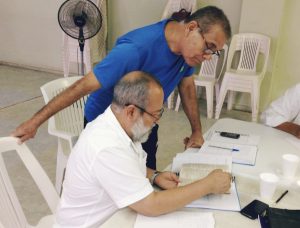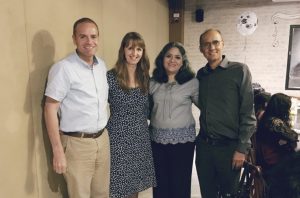Why CMS supports church planting: Checkpoint Spring 2021
 Before Peter Sholl took on his current role as CMS Regional Mission Director, he and Sarah, his wife, were serving as CMS missionaries in Mexico. Here he explains why CMS is committed to planting and supporting local churches.
Before Peter Sholl took on his current role as CMS Regional Mission Director, he and Sarah, his wife, were serving as CMS missionaries in Mexico. Here he explains why CMS is committed to planting and supporting local churches.
Seven years ago, I was standing with a friend, Rolando, in his church in regional Mexico. The Sunday morning meeting had finished, and I was asking him about his plans for the church. The 80 or so people gathered that day were filling their rented commercial space and they needed more room.
A strategy of multiplication
I’d met Rolando a few years earlier and had been involved in regular training courses at his church. We were friends and always enjoyed good conversation. But this time he looked at me as if to say, ‘Have I taught you nothing?’
The plans he had for the future were exactly the same as the plans he had enacted previously. From this current church, he’d invite 15 people to go and start a new church somewhere else in the city. “Great,” I said. “Who will be the pastor of the church?” Again, he gave me the same look. “One of the 15, of course!”
The new leader would be someone Rolando had been mentoring for several years. Together they had been studying the material I was helping teach (MOCLAM*),
and learning to pastor people through experience, feedback and encouragement.
For Rolando, this culture of mentoring, preparing, sending, and planting was not novel or surprising. It was part of his day-to-day ministry and was also a clear statement of his belief in the importance of the local church. It was a privilege for me to know Rolando and be part of the church planting work he was leading.

Rolando and a church leader at work
CMS missionaries are helping plant and grow local churches
All over the world CMS missionaries are involved in local churches—new churches, old historic churches, movements to plant churches, small gatherings of believers. As we continue to support and send workers to do this task, a fundamental question needs to be asked. Do we think planting and supporting the local church matters?
For decades CMS has been answering that question with an unequivocal YES!
But why? Are we just following historical patterns? (We’ve always done it that way.) Are we just being pragmatists? (We do it that way because it works.) Are we doing it because of personal preference? (We personally think it is the right way to do it.)
Or is there a theological reason? Let us consider what the Bible says about the importance of planting and (especially) supporting the local church, and offer some observations about why CMS is involved in local church ministry around the world.
What the Old Testament says about God’s gathering
In the Old Testament we see that God’s people Israel are a gathered people, an assembly—a local ‘church’, massive in size but nonetheless gathered together. They were God’s holy people and his treasured possession (Exodus 19:5-6). They gathered to hear God speak and to learn what it was that God desired for them.
The prophets throughout the Old Testament speak to all of God’s people, “Hear the word of the Lord, O house of Jacob, and all the clans of the house of Israel.” (Jeremiah 2:4) Even when the Lord speaks to individuals, they are representatives of, or messengers to, everyone. (e.g. Joshua 1:1-2)
When outsiders come into Israel, they experience the blessings of God not simply as individuals, but as people witnessing the blessing of the whole nation of Israel (for a picture of what this looks like, see 1 Kings 10:1-10)
Do we think planting and supporting the local church matters?
For decades CMS has been answering that question with an unequivocal YES!
There is also a national, corporate nature to Israel’s disobedience, punishment and redemption. When Isaiah laments Israel’s rejection of the Lord, he is lamenting the
nation’s rebellion (Isaiah 1:1-4). The direct consequence of this rebellion is a horrifying exile into Babylon and beyond (Psalm 85, Psalm 137). The glorious vision of return from this exile is also a vision of new creation: a redeemed people gathered under God’s blessing (Isaiah 65:17-25, Ezekiel 34:25-31). In other words, and in the way the Bible uses the word, it is a church.

Peter and Sarah with Kenya, Rolando’s wife and Rolando.
What the New Testament says about God’s church
Jesus begins his ministry with a bold announcement. “The time is fulfilled, and the kingdom of God is at hand; repent and believe in the gospel.” (Mark 1:15) Those who believe follow him. By the end of Jesus’ earthly ministry, there is a small group of believers gathered and devoted to prayer. (Acts 1:14) The New Testament church is born as Jesus proclaims—and brings about through his death, resurrection, and ascension—the gospel of the kingdom of God.
Next the book of Acts gives us a record of the growth of the gospel. That growth is visible in the growth of new gatherings—local churches—across the region. We see
this in Acts 11:19-30, 14:24-28, 17:1-4; and Paul vividly summarises the growing process in 1 Thessalonians 1:1-10. As Peter, Paul and the other early evangelists plant churches across the Mediterranean region through their bold declaration of the gospel, one notable characteristic of these fledgling gatherings is their communal ‘vibe’: corporate prayer and singing, common possessions and forms of leadership. (Acts 2:42-47, 4:32-27)
In Ephesians similarly, Paul emphasises the community and corporate nature of church life. There he explains the depth of the gospel and its implications, drawing on Old Testament temple imagery to talk about the new status of believers from any background. “You are no longer strangers and aliens, but you are fellow citizens with the saints and members of the household of God.” (Ephesians 2:19) Here again, the corporate nature of the life of the Christian is clear. We belong together.
Towards the end of the New Testament we gaze into the vision of the new creation. There we see the innumerable gathering of believers from every tribe and tongue,
proclaiming the glories of God. This is the glorious end point of God’s plan to redeem his creation. It is a praise-filled gathering of the Lord’s redeemed. (Revelation 7:10-12)
We are part of a great gathering
This brief Bible survey makes one thing very plain. God saves his people to be part of a gathering. Whether that is the eternal heavenly gathering in the new creation, or the imperfect earthly gathering, being together is a fundamental part of being a Christian. So my friend Rolando, as he commits to equipping and sending out small groups to start new churches, is (in his regional Mexican way) shaping his ministry by this foundational biblical principle: we must gather together around Christ.
This is why so many people have found the COVID-restricted church such a struggle. Yes, we have missed the social interaction and the chance to see people in three
dimensions, but there is something deeper than that. COVID restrictions have been difficult because they have challenged part of our identity—that we are a redeemed people and that we express the reality of our redemption together.

Peter and Rolando with a group of church leaders.
CMS supports local church planting and gathering
So how might this realisation—that our gathering is fundamental to who we are as Christians—influence who CMS sends, where to, and to do what?
It means that CMS will continue to send people to work under local leadership to use their varied gifts to encourage and support the gathering of local believers and be involved in the planting of new gatherings.
This is not just a pragmatic decision (although it does work).
It is not solely a historically-based decision (although it is something CMS has been committed to for years).
Nor is it simply a matter of personal preference (although many would agree with the strategy).
It is a carefully thought-out biblical decision, taking seriously God’s plan of redemption. God is gathering a people for himself. He is doing so by planting and growing local gatherings all over the world CMS, under God, seeks to help plant and grow those churches.
*MOCLAM is a Bible course developed in Australia and translated for use in the Spanish-speaking world.
GO
Can you begin to support the planting and growing of a local church, through relationship, encouragement or leadership? Contact your branch of CMS to discuss the possibilities.
READ MORE:
Former CMS missionary Simon Gillham, now Head of the Department of Mission at Moore College, has written about ‘God’s unchanging plans for mission’. In this series he explores God’s plans for his world, and how he works through all God’s people to bring these about.












































































































